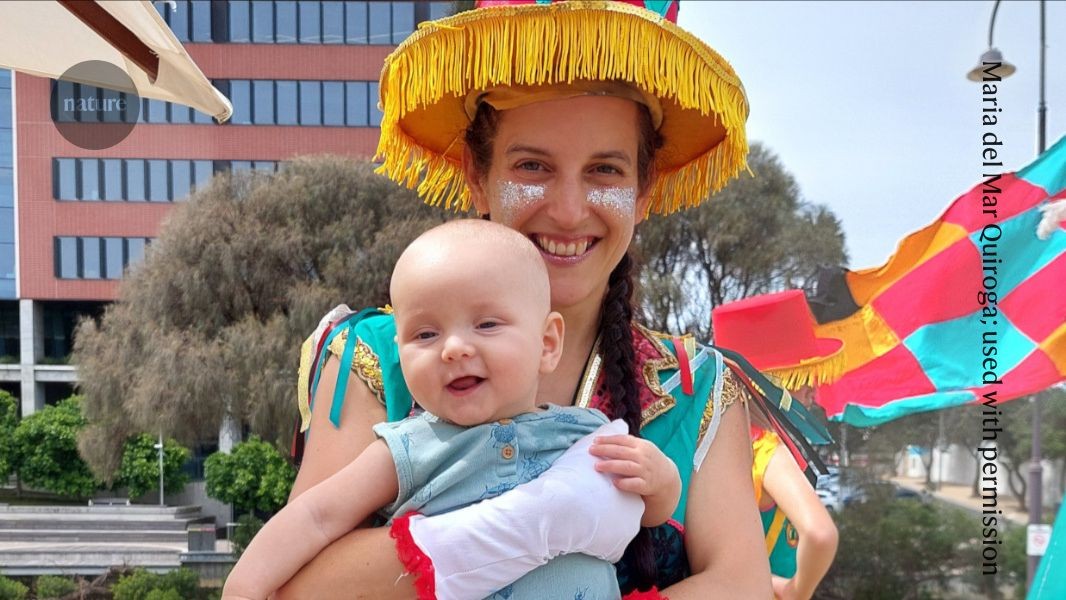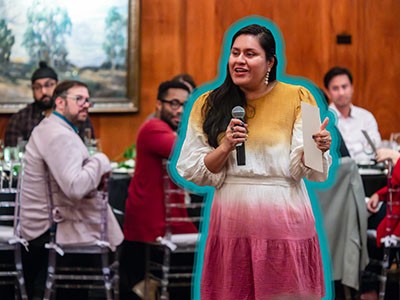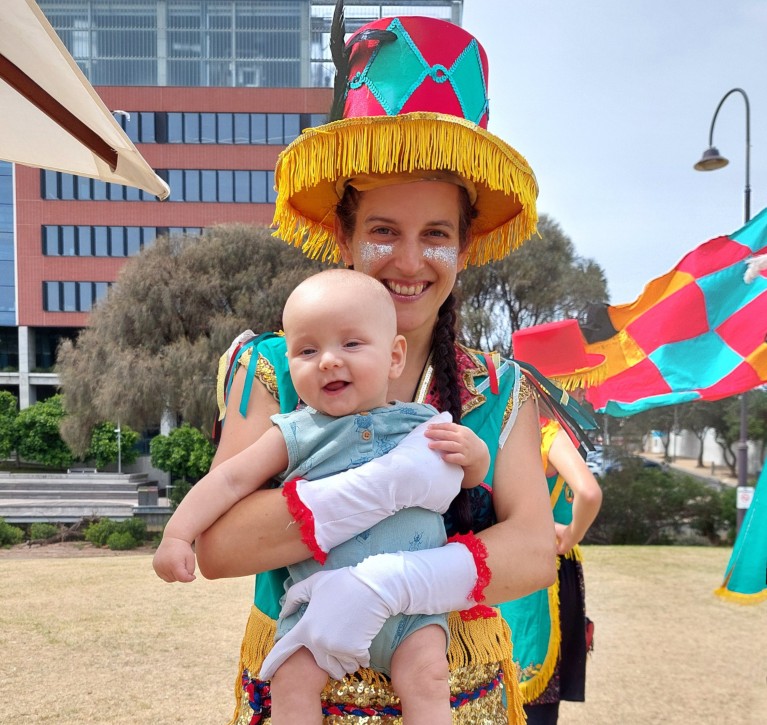
María del Mar Quiroga took her son to a Latinx carnival performance in Australia to stay connected to her Argentinian cultural roots.Credit: María del Mar Quiroga; used with permission
Leaving home in pursuit of academic and professional opportunities is never an easy decision. For many Latinx people (those with a Latin American background or heritage) in science, technology, engineering and mathematics (STEM) careers, moving abroad can open doors to cutting-edge research, stronger funding, better technologies and career-defining collaborations. But it comes at a cost.
Latinx scientists abroad not only face language barriers and the need to navigate new cultures, but also the potential loss of deeply rooted support systems. Parenting can feel like a daily struggle when extended family support — so central to Latinx cultures — is missing. The warmth of Latinx relationships, often expressed through physical closeness, emotional interdependence and deep conversations, isn’t always welcomed in research cultures: environments in which independence and emotional self-containment are more valued. The absence of a strong sense of community, in which neighbours and friends become family, can leave Latinx researchers feeling unanchored and isolated.
Furthermore, many Latin American countries have historically faced underfunded public-education systems, political instability and limited access to advanced STEM training or research infrastructure. This means that Latinx students often arrive abroad already trying to catch up, entering highly competitive environments in which they feel pressure to constantly prove themselves and represent their communities in structures that don’t always understand or accommodate their background. Latinx people remain under-represented in STEM fields, which can add a layer of emotional and mental strain because of increased pressure to perform and a reduced sense of belonging1.
I help to build support systems for Latina researchers
All of these challenges are often compounded by experiences of discrimination, isolation and the pressure to disprove harmful stereotypes — conditions that have been linked to poor health outcomes and increased emotional fatigue in Latino populations2. And although their families back home and the global scientific community might celebrate their success, these groups might overlook the mental-health and personal toll it takes to get there.
Nature’s careers team spoke to four Latin American scientists doing research around the world, to learn not only about their professional and well-being challenges, but also about the strategies that they use to care for themselves. They offer tips and advice that could benefit any researcher who moves from the global south to the global north to train or work.
MARÍA DEL MAR QUIROGA: When parenting abroad, find your helpers
Senior research-data specialist at the Melbourne Data Analytics Platform at the University of Melbourne, Australia.
I studied pure mathematics in Argentina, where the university system is incredibly strong for undergraduate degrees. I really enjoyed my time there, but my options in Argentina were limited to becoming a professor of mathematics, which didn’t appeal to me. So, I decided to pursue a PhD in computational neuroscience at Rutgers University in Newark, New Jersey. I never imagined that I’d then end up in Australia, but I met my partner, who is Australian, during my PhD and years later, I moved to my current position.
Moving overseas is challenging. It’s not an easy decision and no one should take it lightly. Although it offers many career opportunities, such as better salaries and sometimes a higher quality of life, it also comes at a huge cost. You have to give up many things — for example, personal relationships and your culture. However, being exposed to a different culture and way of life makes you appreciate what you have back in your home country. It offers an alternative perspective.
There are cultural challenges when moving abroad. Latinx people are known for being straightforward, emotional and vocal when things aren’t working well, but in the United States, I had to adapt to a more logic-based approach with less emphasis on emotions. Moving to Australia then brought more challenges, because I didn’t have a robust network or a support system here. This has become trickier since having children. I have a three-year-old boy and another child on the way, and those early months of raising a baby with zero support were really tough. We’ve never had anyone else look after our boy — it’s always been just me and my husband. So, whenever I can, I enjoy going back to Argentina on extended holidays because I have a lot of cousins there who can help, and those are the moments when I can relax instead of constantly chasing my son around.
It’s also hard to make deep friendships in which I can share personal and emotional issues. For Latinx people, every activity is an opportunity to build community and networks. When I first arrived in Australia, I joined a yoga group to meet people, but my expectations were unrealistic. Over time, I’ve accepted that my closest and most-open relationships will probably be with other Latinx people. I know some people say, ‘I don’t want to go to the other side of the world and make friends only with Argentinians.’ But I’ve found that having those shared codes, that common language and mutual expectations, is crucial for building friendships. Hobbies have been important as well. I enjoy knitting and crocheting because, unlike research, you can see the progress with every minute you invest. You get something tangible and feel a sense of accomplishment.
I was diagnosed with depression during my PhD studies, and what helped me was therapy, medication and talking about it as much as possible with as many people as I could. I’m very open about it, and simply saying it out loud has a therapeutic effect. It helps me to process it better, even if the other person doesn’t say anything. To cope with impostor syndrome, I keep a ‘feel-good’ folder in my e-mail, in which I save kind messages from people who thank me for helping them or who appreciate my work. I revisit these e-mails when I’m feeling a bit useless or like I can’t do anything right. They remind me of the value and impact of my work.
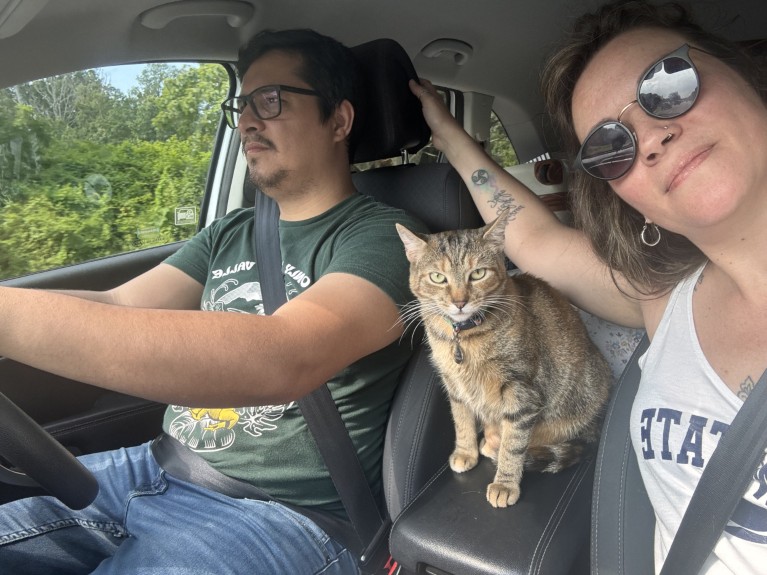
Carolina Lambertini (right), on a road trip with her husband and cat, says finding a mental-health therapist from Brazil who understood her language and culture was key to her well-being. Credit: Carolina Lambertini
CAROLINA LAMBERTINI: Find a therapist who speaks your language
Biologist and postdoctoral scholar at Pennsylvania State University in State College, Pennsylvania.
I did my undergraduate, master’s, PhD and one postdoc in Brazil. My decision to move to the United States in 2022 was driven by better opportunities — especially in terms of funding and access to more-advanced technologies. My research focuses on infectious diseases affecting amphibians worldwide. It was a hard decision to move, because I love my country and at the time, my husband was still in Brazil. It was also scary at first, especially because of the language barrier. I wasn’t born with the privilege of speaking the most dominant language in research. Even in everyday situations, it was difficult. I remember the first time I went to a doctor’s appointment, I couldn’t express exactly what I was feeling. It was horrible. I also remember being on the subway in New York City with my husband — he moved to the United States in 2024 — when a man started yelling at us to speak English, telling us that we didn’t have a right to be there. It made me feel like I didn’t belong. But it shouldn’t have.
Experiences like that triggered my impostor syndrome. I started to wonder what I was doing here, as if I didn’t deserve it. I even began to question my own abilities and felt as if people didn’t like me.
When you leave your country as I did — without my family, friends and husband, not knowing if he would ever be able to join me — everything changes all at once. And my mind just couldn’t take it. It hurt. On top of that, in the beginning, I was putting so much pressure on myself to prove that I deserved to be here, that I forgot to take care of myself. But therapy has boosted my self-esteem and confidence — helping me to recognize my strengths and remember that I belong here. I chose one-to-one talk therapy with a therapist from Brazil, someone who could understand not just my language but also the cultural context that I come from. I know that’s a privilege, but I couldn’t imagine having to translate into English some feelings and words that are so deeply rooted in who I am.
Should I return to my home country after my PhD abroad?
Now, I try to remember that I am qualified to be here, that I speak two languages and that I was selected from a pool of many researchers for this opportunity. I deserve it! Therapy has also helped me to manage my depression, for which I’ve been receiving medical treatment for a year and a half. Now I feel better. Being so far away from my family will never stop hurting, but I’ve learnt how to move through my routines without them.
I also talk to my mum every day — sometimes twice — and we video call for special occasions such as birthdays. That helps with the saudade, a Portuguese word for that deep feeling of missing someone you love. Developing friendships has also helped, although cultural differences have made it difficult to form close connections with people from the United States. But sharing life experiences with people from other countries who can relate has been wonderful.
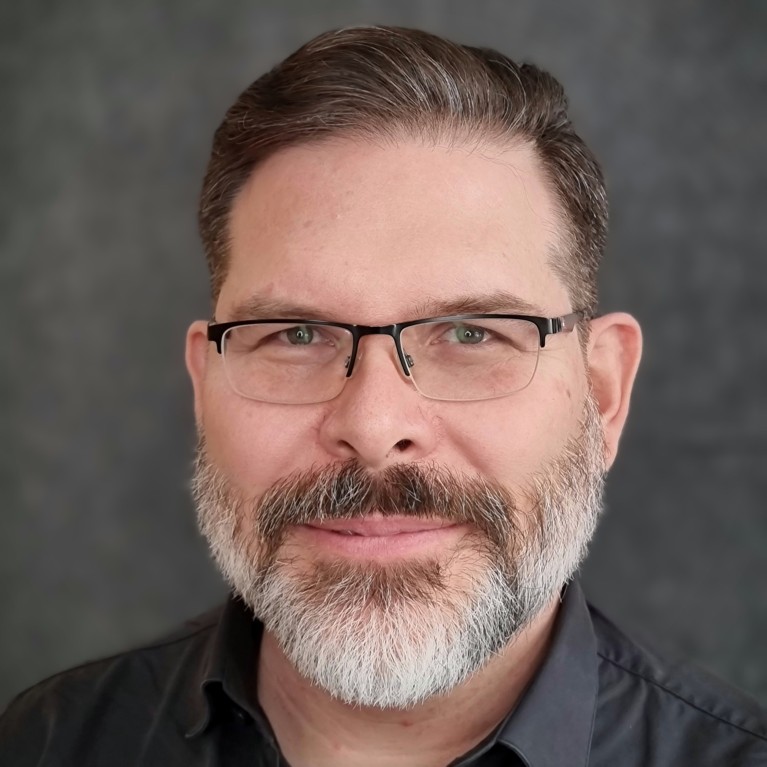
An episode of extreme burnout helped data-visualization researcher Mario Romero to find ways to rebalance his working life.Credit: Mario Romero 2022
MARIO ROMERO: Don’t overwork or you will lose yourself
Professor of visualization at Linköping University in Sweden and national technical manager at InfraVis, a Swedish research infrastructure for data analysis and visualization.
I grew up in Ecuador and completed two engineering degrees there. I then pursued a master’s degree in machine learning at the University of Illinois at Urbana-Champaign, and a PhD in computer science at the Georgia Institute of Technology in Atlanta, where my wife, who is also from Ecuador, was earning a PhD in biomedical engineering.
Sadly, returning to Ecuador was not an option for us, for two reasons. First, my wife and I would have returned to mostly teaching positions, perhaps getting one research project every couple of years if we were lucky enough to secure both students and funding. And second, because Ecuador was not safe for us. My family experienced gang-related violence there, and my wife and I decided it wasn’t a safe or healthy environment in which to raise our two children, who were one and four years old at the time. Instead, we chose to explore opportunities in Sweden, where my wife’s sister lives. It offered the chance to be close to family and raise our children near their cousins of the same age, and engage with the country’s strong research and innovation culture.
In Ecuador, I didn’t receive a good secondary-school education, and it had a lasting impact on my foundational academic skills. There were regular teachers’ strikes, with classes often suspended for weeks or months. Those disruptions meant that I missed out on building core skills, especially in maths.
But there are three strategies that have worked for me while I pursued a research career, and I recommend them to anyone who wants to become a scientist, no matter their background. First, learn to be a good communicator and master academic writing in English. Second, make sure that you understand maths deeply — and use a pen and paper for calculations to really grasp each concept. Third, practise public speaking so that you can share your thoughts clearly and confidently in front of others.


